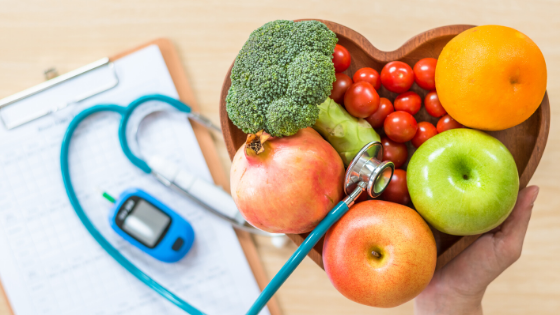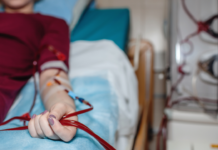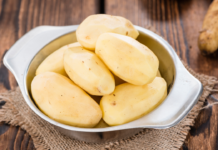Written By: Marcia Pell
The views expressed here are those of the author and not necessarily those of The Hope or its sponsor Kibow Biotech®. A doctor should always be consulted before making any changes to your diet.
Do you have both diabetes and chronic kidney disease (CKD) and wonder what to eat? Many people believe that there are so many dietary restrictions when you have these conditions that there is nothing left to eat. Some get confused and rather than learn how to eat a safe and nutritious diet, they give up. Still, others think that CKD is inevitable because they have diabetes. They believe there is nothing they can do. Not true!
Here are the facts: Diabetes is often associated with high blood pressure. Uncontrolled diabetes combined with high blood pressure damage blood vessels and increases the risk of CKD.
The good news is there is a lot you can do that can help keep your kidney function from worsening. The goal is to:
1. have glucose within an acceptable range;
2. bring your blood pressure down to an acceptable level; and
3. protect the kidney– that is, eat enough protein to keep you healthy but not an extra amount which may cause damage.
If you have these conditions, you almost certainly need a registered dietitian nutritionist (RDN) knowledgeable in diabetes and renal nutrition to help you. A tailored plan based on your current lab results, preferences, and lifestyle is the gold standard. There is no one “renal diabetes diet” that fits everyone. There are no forbidden foods, and there are no foods that are a “magic bullet.”
In general, you need a balanced healthy diet with the correct amount of protein. It is hard for the kidneys to get rid of excess protein when you have CKD. How much you need depends on your unique physical make-up. There is no “one size fits all.”
For a basic understanding of what to eat if you have hypertension and kidney disease without the complication of also having diabetes, you may consult author Aisling Whelan’s excellent article on the nuts and bolts of healthy pre-dialysis diet. It covers what to eat for this combination of conditions.
If diabetes is combined in the mix of chronic kidney disease and hypertension, there is more to do. Don’t be discouraged. There is help available. Having well-managed glucose levels lowers the risk of the continued lowering of kidney function (and subsequent need for dialysis). Anyone who is on dialysis will tell you that it is easier to manage your glucose levels than to go on dialysis.
There are two primary types of diabetes and diet and treatment varies slightly depending on your diagnosis. People with Type 1 diabetes do not make any insulin and have to inject or pump insulin to maintain their glucose level. They usually take insulin based on the carbohydrate amount they are about to eat. People with Type 2 diabetes have insulin resistance and do not make enough insulin (but may make some). They may take various types of medication and/or insulin depending on their body’s production of insulin. People with Type 2 diabetes benefit from routine meals taking inconsistent amounts of carbohydrates.
No matter what type of diabetes you have the goal is not to eat as few carbohydrates as possible. A healthy amount of carbohydrate is essential. Remember your protein is limited when you have CKD. You can’t keep protein and carbohydrate both low and get enough essential nutrients. You also won’t feel satisfied after your meal.
A common mistake when you have diabetes is to think “meat is free” because it does not have carbohydrate. Some people with diabetes erroneously think it’s better to eat very little carbohydrate and not worry about their protein intake. Filling up on large meat portions and not eating enough plant-based foods doesn’t work well for either managing diabetes or protecting your kidneys.
A healthy diet is a balance of fruits, vegetables, grains, lean proteins, low-fat/fat-free dairy, and healthy plant-based fats. Some of these foods have carbohydrates that break down to glucose and provides our body with energy. When you have diabetes it is important to have moderate amounts at each meal rather than too much at one time. Having routine meals containing a sensible amount of both protein and carbohydrates each time is recommended. A consistent amount of carbohydrate can help keep your blood sugars managed at a healthy level. Foods that contain carbohydrates are starchy vegetables (peas corn, potatoes, and beans), grains (such as rice, pasta, oats, and bread), fruits, milk and yogurt, and sweets (such as desserts and sugar-sweetened beverages). Everyone, whether you have diabetes or not, should limit sweets because they provide calories but little nutritional value.
To sum things up, a healthy diet for Chronic Kidney Disease and Diabetes should be individualized to the person based on their current labs, preferences, and health goals. A registered dietitian nutritionist is uniquely qualified to help you develop a plan to meet your needs (and that you can actually follow). You can find a registered dietitian in your area at eatright.org.
If you have been diagnosed with diabetes but not had diabetes education, you can learn to manage your blood sugar by finding a certified diabetes care and education specialist at diabeteseducator.org. Having support and education can make a world of difference when living with Chronic Kidney Disease and diabetes. So stay positive, stay educated, get help and be healthy!
Sponsored By: Kibow Biotech® 
About the author: Marcia Pell
Read her kidney donation story: You can read her story here.
Visit her website: More information about diabetes is available at MarciaPell.com.





